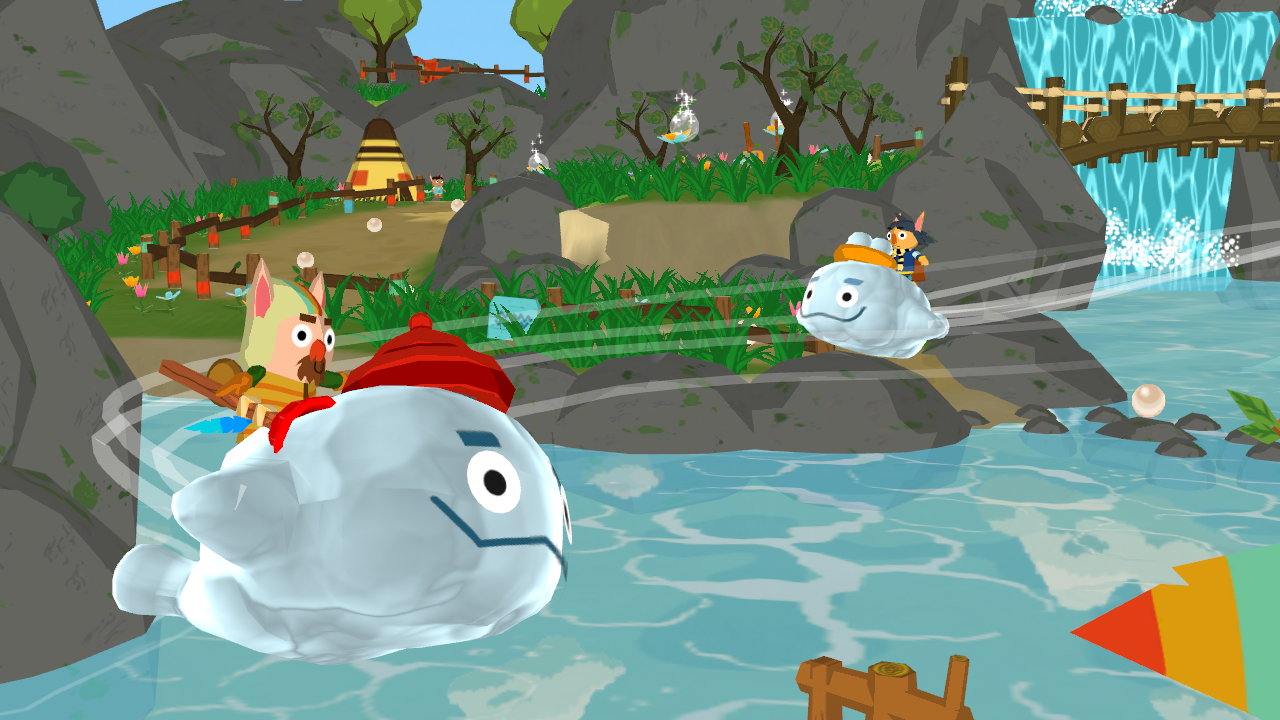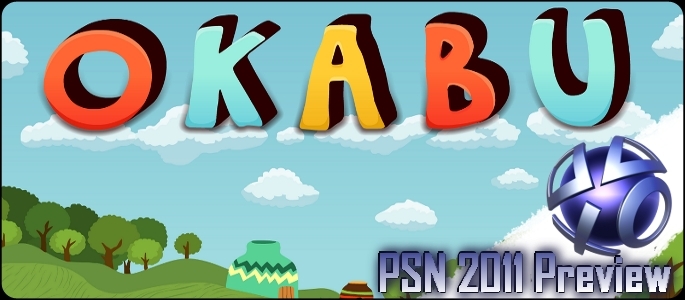The PlayStation platform has always been home to beautifully artistic games, from developers such as Team Ico and thatgamecompany, and with the PlayStation Network, the prevalence of such titles has grown exponentially. Independent developer HandCircus, the creators of Rolando on the iPhone, is planning to bring a rather unique title exclusively to the PlayStation Network. Okabu literally pits players in a cloud of artistic puzzling adventures. As Kumulo, Nimbe and the cloud-flying heroes, players battle to save their world from the threat of the industrialized Doza. Complete with a cooperative campaign, Okabu is one of 2011’s premier indie games for the PlayStation 3.
To learn about the game, the importance of nature and individuality in games, as well as what’s next for Okabu – from possible Move support to a portable future, PlayStation LifeStyle interviewed Simon Oliver, the founder of HandCircus.
Hi Simon, could you start by introducing yourself, and telling us about your work at HandCircus?
Hi, I’m Simon Oliver, the founder of HandCircus, an indie game studio based in London and dedicated to creating bold, original, and playful games. We started up in 2008, releasing our first game, Rolando, for the iPhone and following up with the sequel “Rolando 2: Quest for the Golden Orchid” in the Summer of 2009. We were really blown away with the success of the Rolando series, and it has encouraged us to look a little bigger for our next title, the action-puzzle adventure “Okabu“, coming to PlayStation 3 this year.
When you compare the scale of the 3D console game Okabu to that of the 2D mobile game Rolando, how did your development process change? Were you prepared for any difficulties with console development?
Despite the differences in platforms, much of a design process has stayed the same – we are great believers in prototyping, iteration and user testing, and have continued to use these techniques to make Okabu as fun and accessible as possible. You’ll also notice that they share the same charming look and feel as we have Rolando‘s concept artist, Mikko, creating all manner of illustrations: from dastardly Doza machinery, to the many creatures of the world such as charging bulls, hooting owls, and our heroes, the Yorubo.
Things are obviously very different from a technological perspective, as the PS3 is quite a beast compared to the modest power of iOS devices. The engine is entirely new, and we’ve created our own level creation tools. Once again have been able to take advantage of some of the awesome open-source libraries out there to allow us to really focus on making the game as fun as it can be. Console development does present its own challenges, and I’ve learned a lot personally, but Matt, Luke and Shane here at HandCircus have many years experience of creating console games, working on titles such as LittleBigPlanet, Fluidity, the Silent Hill series and Ratchet and Clank.
Why did you decide to release the game only on PS3?
We spoke to a lot of potential partners during the early stages of Okabu‘s development, to find a partner to work with that shared our enthusiasm for Okabu and the direction we wanted to head in. Sony have been awesome to work with, and really felt like the perfect match when we started talking.
How important do you think uniqueness is in a game? Can striving for individuality damage the enjoyment of a game?
I think you need to consider the overall concept and design of a game, and consider whether it works as a whole. You should follow your heart with the design and if the project naturally evolves into a game that offers a really fresh take one on something (such as the game’s art direction, game design, or narrative) then that’s a wonderful thing.
Why do you think the power of nature plays such an important role in many indie games – such as PixelJunk Eden, Flower, and of course Okabu?
And Tokyo Jungle! For us it really is as simple as finding nature particularly inspiring. I’ve been obsessed with animals and natural history programs since I was a kid, and always been blown away by artists and designers that have incorporated elements of nature into their work, from Gaudi’s exotic buildings to the films of Studio Ghibli. I think there are still a lot more games about punching and shooting, so hopefully us nature-inspired indie game makers are helping to balance things out!

When you announced the game, you said: “We are thrilled to introduce gamers to the bright, bold world of Okabu“. How large and varied will this world be?
A lot will be revealed of the coming months – there is a great deal of variety spread throughout the world of Okabu – wildly different environments, challenges, puzzles, toys, creatures and machines. In addition to the abilities of Kumulo and Nimbe, each of the four cloud flying heroes has a unique skill that provides a completely different game mechanic and new way of interacting with the world.
Are there any plans to bring Okabu to other platforms, or develop a sequel to the game?
We see Okabu as a world that we’d like to nurture and grow for many years, across several different platforms. With our previous experience on mobile we’re very interested in bringing an Okabu game to mobile/portable platforms in the near future.
Co-op gameplay is sadly a rarity in console games, why did you decide to include it?
It felt like a very natural fit for the game (especially with Okabu‘s emphasis on teamwork and collaborative puzzle solving), and its a feature that we thought would be really appealing to players. There are some awesome co-op and multiplayer titles on PSN, such as Joe Danger, Castle Crashers and the PixelJunk, games and we’re hoping Okabu will fit in there very comfortably.
In Rolando 2: Quest for the Golden Orchid, gamers could acquire Golden Idols that allowed players to skip challenging levels, is this something you are planning to implement in Okabu?
The Golden Idol feature came from user testing – the last thing we wanted was for players to abandon the game just because they got stuck on a single level, so it made sense to allow for some flexibility if they were finding one section particularly challenging. We’ve yet to do the final balancing of the game’s progression, so don’t have any definite plans for a similar feature yet.
Did you consider adding Move support?
Our primary focus is making it as good as it can possibly be on Sixaxis/DualShock 3. Move is an awesome technology, and something that we have considered throughout the design phase.
Do you have any further updates on when the game will release?
Okabu will be out this summer – keep an eye out!
PlayStation LifeStyle would like to thank Simon Oliver for taking time out of his busy schedule to answer the interview questions.




